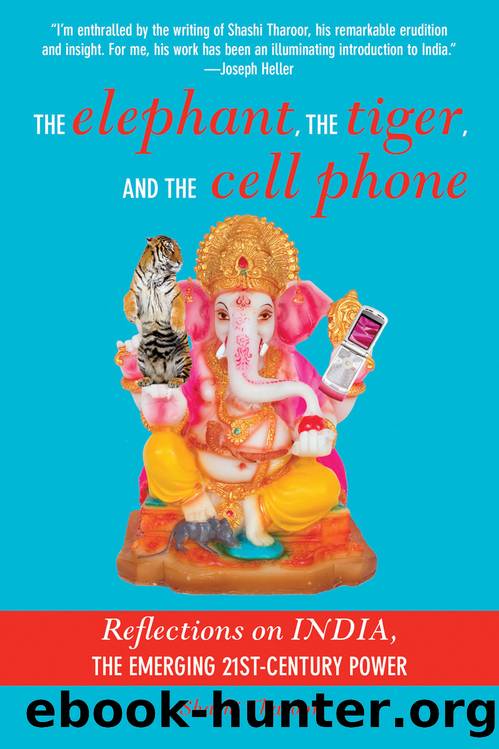The Elephant, the Tiger, and the Cell Phone: Reflections on India - the Emerging 21st-Century Power by Shashi Tharoor

Author:Shashi Tharoor [Tharoor, Shashi]
Language: eng
Format: epub
ISBN: 9781559708944
Google: _yFGPgAACAAJ
Amazon: B006G8FPE6
Publisher: Arcade Publishing
Published: 2007-10-15T07:00:00+00:00
37
The Dear Departed
I cannot omit, from a section on the people who made up my sense of âmyâ India, Indians who are far from famous, but who profoundly touched my life and mind, none more so than my own father.
MY FATHER'S HEART
IT WAS IN 1993, WHEN I WAS THIRTY-SEVEN YEARS OLD and a father myself, that the telephone call I had been dreading for twenty-five yearsâever since my father, then thirty-eight, had his first massive coronaryâfinally came. On October 23, 1993, Chandran Tharoor's heart had finally given in.
For a quarter of a century I had feared this moment. I had grown up thinking that every unexpected call at an unusual hour, every unannounced visitor, was to convey the news that my father had suddenly been taken away. Three times in the previous ten years, I had called homeâthree of my hundreds of regular, routine, anxious calls homeâto discover he was in the hospital. Each time he had pulled through. Once, a decade ago, I had brought him to the United States for open-heart surgery and had experienced the very different anxiety of the hospital waiting room, the awful moment when the doctor emerges and you scan his face for the slightest sign of bad news before he speaks. At that time, too, the outcome had been positive. But the time had come when surgery could afford no new solutions. We hoped that my father's zest for life would itself open up the flow to and from his heart. Certainly, there was nothing in that booming voice, that irrepressible spirit, that boundless type-A do-it-all enthusiasm, to suggest that life was ebbing away, that each day his heart was failing, coming closer to admitting a defeat that my father's own manner had never acknowledged.
I was barely twelve when my father first fought for his life in hospital, while I battled fear and bewilderment and prayed for him to recover. He was the only security my mother and little sisters and I had in the world. His work, his income, his drive, kept us in style, fed and clothed us well, sent us to the best schools in Bombay. I loved him: the word games we played together, the cricket matches he took me to, the magic of his irresistible smile as his warm brown eyes lit up at me, even the daily (and all too uncritical) encouragement he provided my writing. But I also understood that my father's survival was intimately bound up with my own, that his dreams for me could founder on his own mortality.
With each passing year, of course, this became less true. As I finished my studies at breakneck speed (always fearing my luckâhis healthâwould run out before I could attain my goals) and embarked on a career, I shed my material vulnerabilities. But the fear of his loss had become so deeply entrenched that it continued to dominate me, my own heart shuddering whenever the faint hollow whine on the telephone suggested an unexpected international call.
Now it
Download
This site does not store any files on its server. We only index and link to content provided by other sites. Please contact the content providers to delete copyright contents if any and email us, we'll remove relevant links or contents immediately.
Zero to IPO: Over $1 Trillion of Actionable Advice from the World's Most Successful Entrepreneurs by Frederic Kerrest(4525)
Machine Learning at Scale with H2O by Gregory Keys | David Whiting(4295)
Never by Ken Follett(3937)
Harry Potter and the Goblet Of Fire by J.K. Rowling(3848)
Ogilvy on Advertising by David Ogilvy(3605)
Shadow of Night by Deborah Harkness(3360)
The Man Who Died Twice by Richard Osman(3072)
Book of Life by Deborah Harkness(2931)
The Tipping Point by Malcolm Gladwell(2914)
Will by Will Smith(2911)
0041152001443424520 .pdf by Unknown(2843)
Purple Hibiscus by Chimamanda Ngozi Adichie(2827)
My Brilliant Friend by Elena Ferrante(2824)
How Proust Can Change Your Life by Alain De Botton(2807)
How to Pay Zero Taxes, 2018 by Jeff A. Schnepper(2646)
Hooked: A Dark, Contemporary Romance (Never After Series) by Emily McIntire(2550)
Rationality by Steven Pinker(2352)
Can't Hurt Me: Master Your Mind and Defy the Odds - Clean Edition by David Goggins(2324)
Borders by unknow(2304)
